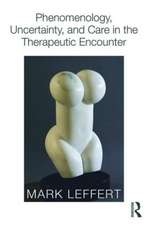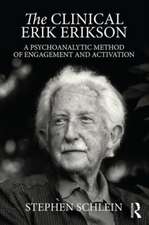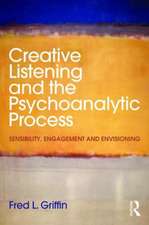Lacanian Psychotherapy: Theory and Practical Applications
Autor Michael J. Milleren Limba Engleză Hardback – 16 mai 2011
| Toate formatele și edițiile | Preț | Express |
|---|---|---|
| Paperback (1) | 317.39 lei 3-5 săpt. | +21.79 lei 4-10 zile |
| Taylor & Francis – 13 mai 2011 | 317.39 lei 3-5 săpt. | +21.79 lei 4-10 zile |
| Hardback (1) | 1102.48 lei 6-8 săpt. | |
| Taylor & Francis – 16 mai 2011 | 1102.48 lei 6-8 săpt. |
Preț: 1102.48 lei
Preț vechi: 1160.50 lei
-5% Nou
Puncte Express: 1654
Preț estimativ în valută:
211.03€ • 229.30$ • 177.38£
211.03€ • 229.30$ • 177.38£
Carte tipărită la comandă
Livrare economică 21 aprilie-05 mai
Preluare comenzi: 021 569.72.76
Specificații
ISBN-13: 9780415893046
ISBN-10: 0415893046
Pagini: 246
Dimensiuni: 152 x 229 x 18 mm
Greutate: 0.62 kg
Ediția:1
Editura: Taylor & Francis
Colecția Routledge
Locul publicării:Oxford, United Kingdom
ISBN-10: 0415893046
Pagini: 246
Dimensiuni: 152 x 229 x 18 mm
Greutate: 0.62 kg
Ediția:1
Editura: Taylor & Francis
Colecția Routledge
Locul publicării:Oxford, United Kingdom
Public țintă
Postgraduate, Professional, and Professional Practice & DevelopmentCuprins
Introduction: Another Psychoanalysis. Shattering Discourse to Bring Free Speech. Evidence and Psychotherapy: A History of Case Histories. Strength in Letters. Aggressiveness in Psychotherapy. Organa Non-Grata. Che Vuoi? The Letter and the Desire of the Other. Conclusions.
Notă biografică
Michael J. Miller, Ph.D., is an Assistant Professor of Psychiatry at SUNY Upstate Medical University, New York, USA and an adjunct professor at Syracuse University, USA. He has been published in The Humanistic Psychologist as well as Lacan and Addictions (Karnac, 2011), and has presented to groups of psychoanalytic clinicians on clinical applications of Lacan.
Recenzii
"Therapists of all persuasions will relish Michael Miller's lucid, beautifully written discussion of the use of Lacan's work in clinical practice. Targeting topics of concern to the widest range of practitioners – including insight, opening up of 'potential space,' transference, countertransference, gender, and power dynamics – he provides word-for-word transcripts of interactions with his clients that beautifully illustrate a Lacanian approach to listening and interpreting that can be applied in a great many therapeutic settings, using theory to illuminate – but never overshadow – the case material. The level of detail provided in his case studies is unrivaled. A fabulous achievement!" - Bruce Fink, Duquesne University, Pennsylvania, USA
"This is an excellent introduction to Lacanian clinical practice, written for the general clinician/psychotherapist who is beginning to consider the field of Lacanian psychoanalysis. Despite the focus being psychotherapy rather than psychoanalysis, the book approaches the scope of analytical experience and provides an abundance of clinical material which should be of great help to the psychotherapist not familiar with the intricacies of Lacanian theory and practice. All in all this is a well-written and insightful book that was a joy to read." - Raul Moncayo, Supervising Analyst of the Lacanian School of Psychoanalysis, and author, Evolving Lacanian Perspectives for Clinical Psychoanalysis
"My psychotherapy training was not Lacanian and I have struggled to make sense of what it might mean to be informed by Lacan. Miller’s book, written by a psychotherapist who regards the relationship as core to any therapy, is a significant contribution to understanding the clinical value of Lacan. Had this book been available earlier, my struggles would have been eased." - Dr Steve Nolan, Therapy Today, December 2011
Michael Miller's book is one of the first to apply Lacan to psychotherapy. ... Miller most adroitly utilises Lacanian ideas to think about the patients in front of him, while concentrating on their speech and discourse 'to the letter', as he tries to make sense of their struggles and distress. The case discussion approach allows us to see a thoughtful and serious psychotherapist at work, without having to be familiar with Lacanian ideas beforehand. This is not just a good book about what a Lacanian approach to psychotherapy might entail, it is also just a good book on psychoanalytic psychotherapy. - Grahame Hayes, Psycho-analytic Psychotherapy in South Africa, Vol. 21(1) 2013
"This is an excellent introduction to Lacanian clinical practice, written for the general clinician/psychotherapist who is beginning to consider the field of Lacanian psychoanalysis. Despite the focus being psychotherapy rather than psychoanalysis, the book approaches the scope of analytical experience and provides an abundance of clinical material which should be of great help to the psychotherapist not familiar with the intricacies of Lacanian theory and practice. All in all this is a well-written and insightful book that was a joy to read." - Raul Moncayo, Supervising Analyst of the Lacanian School of Psychoanalysis, and author, Evolving Lacanian Perspectives for Clinical Psychoanalysis
"My psychotherapy training was not Lacanian and I have struggled to make sense of what it might mean to be informed by Lacan. Miller’s book, written by a psychotherapist who regards the relationship as core to any therapy, is a significant contribution to understanding the clinical value of Lacan. Had this book been available earlier, my struggles would have been eased." - Dr Steve Nolan, Therapy Today, December 2011
Michael Miller's book is one of the first to apply Lacan to psychotherapy. ... Miller most adroitly utilises Lacanian ideas to think about the patients in front of him, while concentrating on their speech and discourse 'to the letter', as he tries to make sense of their struggles and distress. The case discussion approach allows us to see a thoughtful and serious psychotherapist at work, without having to be familiar with Lacanian ideas beforehand. This is not just a good book about what a Lacanian approach to psychotherapy might entail, it is also just a good book on psychoanalytic psychotherapy. - Grahame Hayes, Psycho-analytic Psychotherapy in South Africa, Vol. 21(1) 2013



















